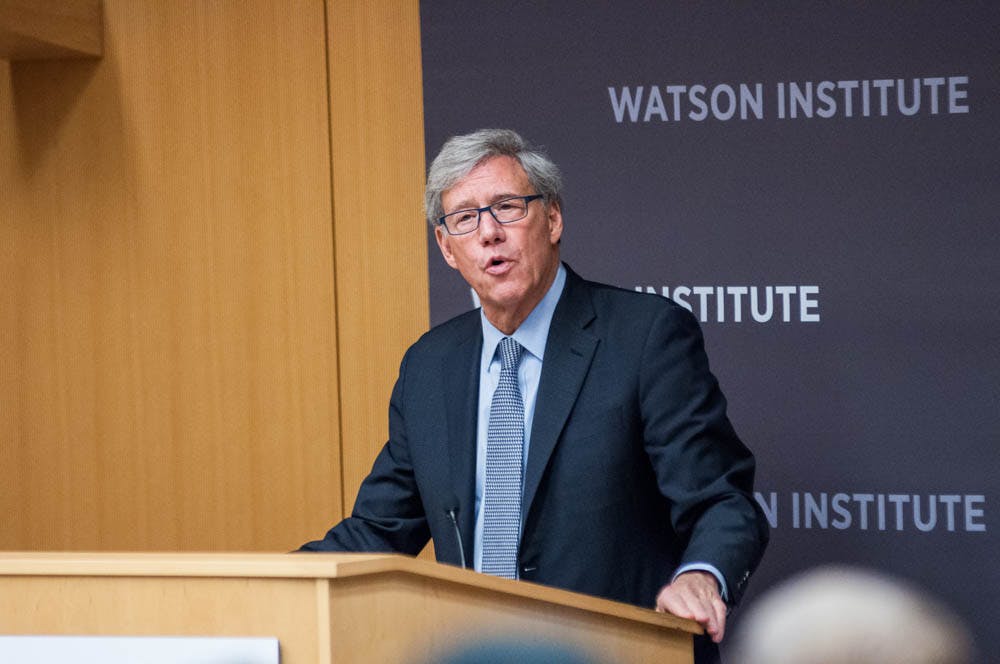Debate is what Geoffrey Stone, professor of law at the University of Chicago, came to the University to encourage, and debate is what he got.
In a lecture at the Watson Institute for International and Public Affairs Friday, Stone discussed the importance of fostering an environment that encourages free expression, especially controversial opinions. His talk was followed by a heated question and answer session about the pragmatism and presentation of his ideas.
Free speech on college campuses has come under national scrutiny again with the protests at the University of California at Berkeley that led to the cancellation of an alt-right speaker’s event Wednesday, said President Christina Paxson P’19 as she introduced Stone.
Stone’s talk, “Free Speech on Campus,” dealt exactly with these issues and was part of a University speaker series “Reaffirming University Values: Campus Dialogue and Discourse.”
Stone chaired the University of Chicago’s Committee on Freedom of Expression in 2015. “My own personal view is that if (universities) aspire to be serious academic institutions, they have to have a profound commitment to debate, discussion and disagreement because that’s how we create knowledge,” Stone told The Herald. “If institutions cut off that debate (and) disagreement, they are, in my view, undermining the central purpose of their being,” he said.
Increasingly, faculty members and students are less comfortable taking controversial positions, Stone told The Herald. One reason is that some students have been raised by “helicopter parents” who have “shielded or protected” them from “discomfort, risk and failure in ways that their predecessors have not,” Stone said. Additionally, those who share controversial views on social media may risk offending potential employers.
“I think it’s an unhealthy thing that social media has produced that environment, but it’s a healthy thing that students” and marginalized groups such as racial and religious “minorities, women (and) gays” have become more vocal about their experiences and intolerance for certain views,” Stone told The Herald.
Contrary to the position espoused by the University of Chicago’s Dean of Students John Ellison’s letter to incoming freshman of the class of 2020, Stone said trigger warnings and safe spaces are not violations of free speech in his view. “The letter written by the dean of students in the college did not reflect the reality or the policies of the University of Chicago. I regard that aspect of that letter as unfortunate,” Stone told The Herald.
The decision to use trigger warnings should be left to professors rather than dictated at an institutional level, Stone told The Herald, emphasizing that faculty members should feel free to use trigger warnings if they think that it would improve the quality of education that students receive.
The University of Chicago “is filled with safe spaces,” Stone said.“There are endless organizations that are designed to bring together students (with) particular experiences, interests (and) background(s).”
But while student groups can serve as safe spaces, universities as a whole must be open to even the “most loathsome, odious, offensive, disloyal arguments,” Stone said in a speech at the American Law Institute’s meeting in May 2016. Universities must ultimately uphold free speech even in the case of hate speech, he said.
“I don’t believe that the idea of hate speech is one that universities should get involved in addressing — any more than it should get involved in communist speech or pro-abortion speech,” Stone told The Herald. “Hate speech is simply speech that says bad things about certain people, and my view is that … the right response to it is to address it and explain why one thinks it’s hateful and wrong” instead of seeking institutional censorship, he added.
In addition, universities should not take political positions to protect freedom of speech on campuses. But exceptions can be made if political actions have “a direct and real effect upon the operation of universities,” such as President Donald Trump’s recent executive order banning immigrants from seven predominantly Muslim countries, Stone said.
Responding to a question from a professor at the event about a university’s responsibility to address institutional oppression, Stone said, “In university communities like ours, we’re not the ones afraid to speak out.” Rather, those afraid to speak out on college campuses are the “Trump supporters” or evangelical Christians, he said.
“Across the University, you should not have certain types of perspectives unrepresented (or) not reasonably represented because of some bias about those views,” Stone said. But in his view, a liberal bias has already taken root at most universities across the country.
A persistent point of tension in Stone’s speech was the conflict between freedom of speech and the need to be civil in an academic setting. Stone said that professors have a right to intervene when racial epithets are directed at students in a classroom. He proceeded to directly name certain racial epithets as examples of unacceptable language.
Naomi Chasek-Macfoy ’18 requested that Stone discontinue the use of racial slurs in his speech, to which Stone replied that racial epithets should be allowed in the classroom if they are relevant to the discussion or mentioned in course materials. “Someone who goes around yelling and screaming racial epithets even outside the classroom, I would say, is being a jackass. Is that okay — can I say that?” he joked.
Many attendees told The Herald that they were uncomfortable with Stone’s response to Chasek-Macfoy’s question. While some students might have even agreed with Stone, “the fact that he was mocking (Chasek-Macfoy) — from then on, I lost my respect for him,” Areeb Mahamadi ’17 said. “I thought he was rude.”





